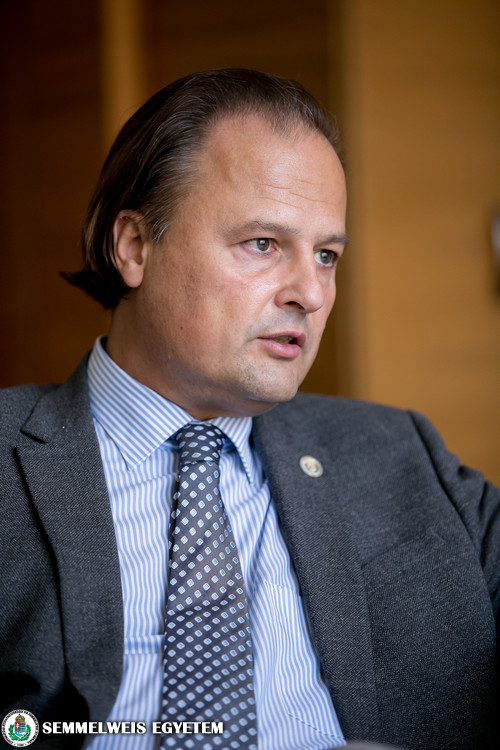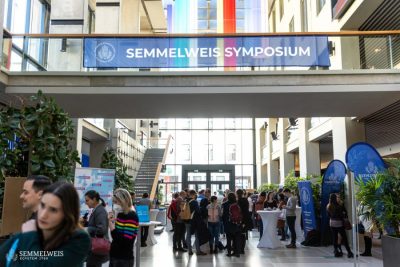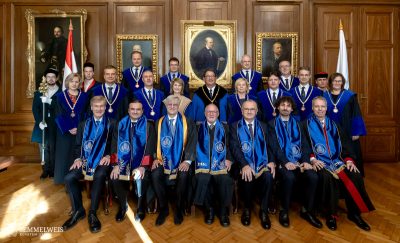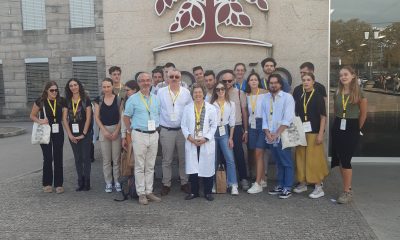 “From the coming academic year, the number of state scholarship positions at Semmelweis University’s Károly Rácz School of PhD Studies has increased by 50%, with a full capacity of 156 scholarship students set to begin their studies in September,” said Dr. Zoltán Benyó, who has been named the new president of the Doctoral Council as of July 1, and who in the past six years was the head of the School of PhD Studies’ (DI) educational and credit board. He emphasized that the majority of those accepted are graduates of Semmelweis University. “It is key that a significant proportion of those taking part in the PhD program should come from the university itself, since they represent the next generation of teachers and researchers,” noted the new president, who considers helping to achieve this goal one of his main tasks.
“From the coming academic year, the number of state scholarship positions at Semmelweis University’s Károly Rácz School of PhD Studies has increased by 50%, with a full capacity of 156 scholarship students set to begin their studies in September,” said Dr. Zoltán Benyó, who has been named the new president of the Doctoral Council as of July 1, and who in the past six years was the head of the School of PhD Studies’ (DI) educational and credit board. He emphasized that the majority of those accepted are graduates of Semmelweis University. “It is key that a significant proportion of those taking part in the PhD program should come from the university itself, since they represent the next generation of teachers and researchers,” noted the new president, who considers helping to achieve this goal one of his main tasks.
He pointed out that several recent changes have been made to the DI’s regulations in order to help achieve the above-mentioned goals. Thus, from the current academic year it will be possible for students to take part in residency training and the PhD program simultaneously. “We wanted to put an end to students have to choose between specialist and PhD training, since earlier, if they wanted to do both then that meant that 5-6 years of undergraduate training, depending on the faculty, would have to be followed by 4 years in the PhD program and then another 4-5-6 years of specialist training,” he explained.
The scholarship program serves a similar purpose, as it makes it possible for the best TDK students to get involved in the PhD program already in the last two years of undergraduate training, as many of them can present significant scientific achievements already by the end of university. The funding for this program is currently provided by the EFOP-VEKOP tender that the university won two years ago and which lasts until 2021. Dr. Zoltán Benyó considers it an important task to secure the necessary funding to continue this program in the future as well. He would also like it to become more of a general practice for TDK students to get involved in the PhD program already from their fourth or fifth years. The opportunity is also open to students enrolled in the English and German-language programs, and international students will also receive information on this in a message through the Neptun system in September, he said. Increasing the number of international students in the PhD program is also important for the university’s international reputation, he emphasized, adding that the long-term plan is to attract international students who did not graduate at Semmelweis to the tuition-paying program as well.
The opportunity for undergraduate students to start the PhD program is also supported by the curriculum reform that has been put in place starting from September, with the schedule allowing for work on TDK studies from the fourth year, as students will have one day dedicated each week for such purposes. “Taking part simultaneously in the undergraduate and PhD programs requires dedication, excellent abilities and great diligence. This opportunity is for the best students, and the main goal is precisely to keep these kinds of students here in Hungary and involve them in PhD programs,” noted Dr. Zoltán Benyó.
The new president of the Doctoral Council also mentioned that the accreditation process of the new doctoral school of health sciences is expected to be completed soon. In addition, he said that the plan is to expand the range of fields covered by doctoral schools to include social sciences, primarily sociology-related topics, for the time being within the framework of the current doctoral schools. In the future, areas where there is a possibility of international collaboration will receive more emphasis within PhD topics. Dr. Zoltán Benyó believes it is very useful for students to spend one or two semesters abroad via exchange programs. He noted that there was a discussion with the University of Heidelberg in May on possible areas of cooperation, and the members of the German delegation said they see opportunities for exchange programs mainly in the areas of cardiovascular, oncology, cell and molecular research, immunology and nephrology research. The Doctoral School would like to establish similar cooperation with other universities in western Europe, and talks are already underway with the University of Freiburg.
Dr. Zoltán Benyó said he plans to increase the number of PhD research topics, for which he intends to involve as supervisors young researchers who recently received their doctorates. “We also introduced a program last year financed from the EFOP-VEKOP funds to address them specifically. This involves providing additional financial support form the research of the first supervised student, to ensure that the limited amount of research funds does not hinder the introduction of new topics,” he added.
The president of the Doctoral Council pointed out that a significant part, more than half of all publications by the university is the result of the work of PhD students, which demonstrates the importance of this area. The best students are the ones that take part in the PhD program, and supporting them is the main task of the School of PhD Studies, he noted. Dr. Zoltán Benyó said he is fortunate to be charged with tasks that he is most willing to take on. “We work with the most committed and talented students, and their enthusiasm and energy is such a motivation for us too that makes it possible for good things to come out of our cooperation,” he stressed.
Pálma Dobozi
Translation: Tamás Deme
Photo: Attila Kovács – Semmelweis University



